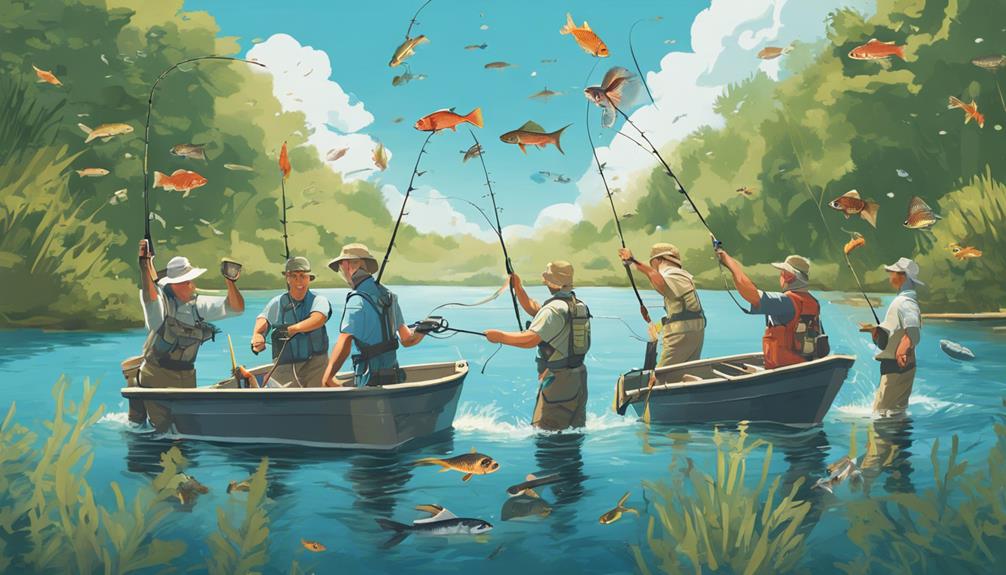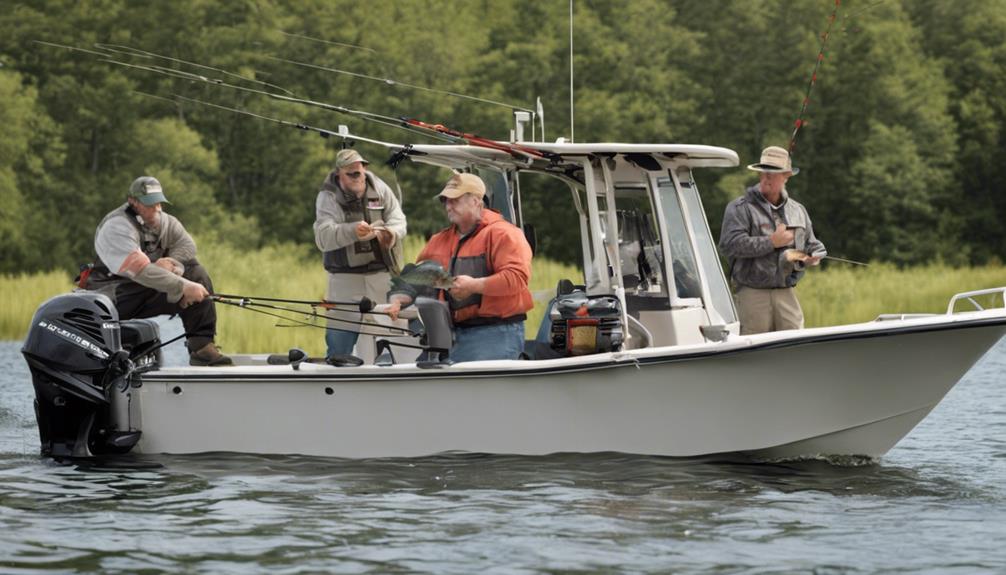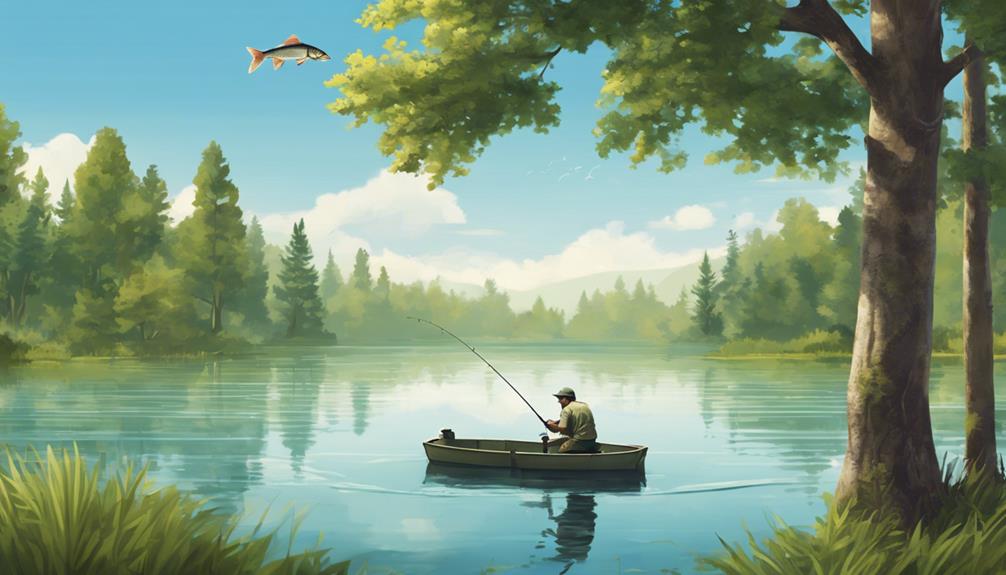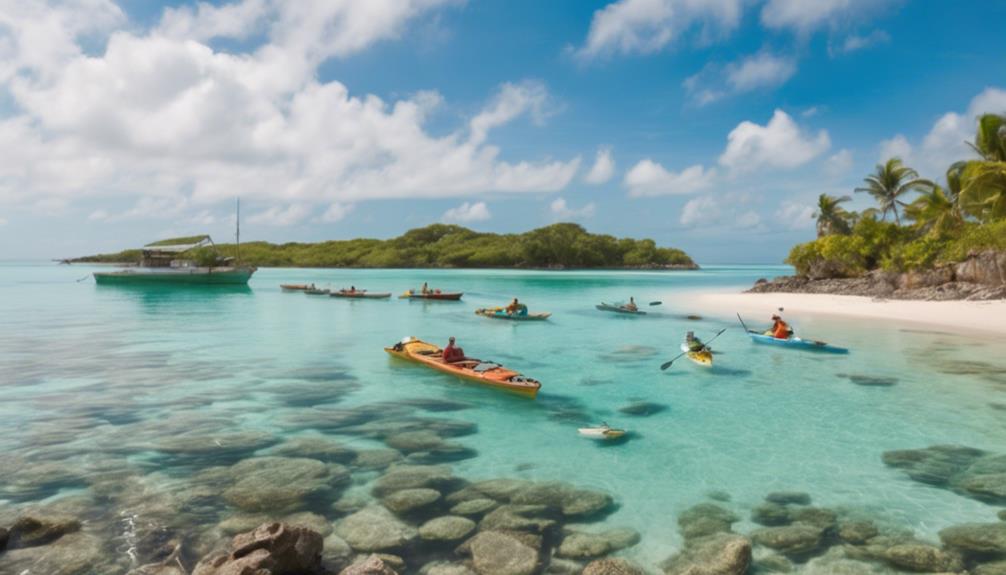Imagine anglers as guardians of the underwater world, akin to silent sentinels who bear witness to the ebb and flow of aquatic life. Their passion for fishing extends beyond catching prized trophies; it intertwines with a deep-rooted commitment to conservation.
As you cast your line into the shimmering waters, consider the untold ways anglers play a crucial role in safeguarding our marine ecosystems. From nurturing fish stocks to safeguarding habitats, their impact resonates far and wide, shaping the future of our waters.
Anglers as Environmental Stewards
As environmental stewards, anglers play a vital role in conserving fishing resources by actively engaging in sustainable practices. Through environmental education and community outreach efforts, anglers spread awareness about the importance of preserving aquatic habitats and wildlife protection. By sharing their knowledge and passion for fishing with others, anglers inspire a sense of responsibility towards ecosystem preservation among fellow anglers and the broader community.
Anglers actively participate in wildlife protection by adhering to catch limits, practicing proper catch-and-release techniques, and advocating for sustainable fishing practices. By respecting regulations and guidelines set forth by conservation authorities, anglers ensure the longevity of fish populations and contribute to maintaining a balanced ecosystem. Additionally, anglers support habitat restoration initiatives and participate in clean-up activities to mitigate the impact of pollution on aquatic environments.
Engaging in ecosystem preservation, anglers recognize the interconnectedness of all living organisms within the aquatic ecosystem. By promoting sustainable fishing practices and responsible angling behaviors, anglers help prevent overexploitation of fish stocks and preserve the delicate balance of marine and freshwater environments. Through their actions and advocacy, anglers demonstrate a deep commitment to conserving fishing resources for future generations to enjoy.
Funding Conservation Efforts
To support conservation efforts effectively, anglers can contribute financially through various channels. By actively engaging in funding conservation efforts, anglers play a crucial role in preserving and enhancing the environment for future generations. Here are some key ways anglers can financially support conservation:
- Community Partnerships: By collaborating with local communities, anglers can pool resources and support initiatives that benefit the environment and fish populations. Building strong community partnerships can amplify the impact of conservation efforts.
- Conservation Grants: Seeking out and applying for conservation grants can provide financial support for projects aimed at protecting fish habitats, promoting sustainable fishing practices, and conducting research on marine ecosystems.
- Corporate Sponsorships: Partnering with corporations that value environmental conservation can bring in significant funding for conservation projects. Corporate sponsorships can help scale up conservation efforts and reach a broader audience.
- Research Initiatives: Investing in research initiatives focused on understanding fish populations, ecosystems, and conservation strategies is crucial for making informed decisions and implementing effective conservation measures.
Restoring Fish Populations
Restoration of fish populations requires strategic planning and concerted efforts from anglers and conservation organizations alike. Population management plays a crucial role in ensuring the sustainability of fish species and maintaining a healthy ecosystem. By actively participating in stocking programs, habitat restoration projects, and catch-and-release practices, anglers can contribute significantly to boosting fish populations.
To restore fish populations effectively, it's essential to focus on enhancing species diversity. This involves not only replenishing the numbers of popular game fish but also considering the conservation of less targeted species. By promoting biodiversity through responsible fishing practices, anglers can help maintain a balanced aquatic environment where different species can thrive.
Conservation organizations often spearhead initiatives aimed at restoring fish populations by conducting research, implementing conservation plans, and advocating for sustainable fishing practices. Anglers can support these efforts by staying informed about local conservation projects, volunteering for restoration activities, and adhering to regulations designed to protect fish populations.
Collaboration between anglers and conservation organizations is key to achieving long-term success in restoring fish populations. By working together towards common goals, such as improving habitat quality, controlling invasive species, and promoting sustainable fishing practices, anglers can make a significant impact on preserving fish populations for future generations to enjoy.
Advocating for Clean Water
By championing for clean water, you play a vital role in safeguarding the environment and ensuring the health of aquatic ecosystems. As an angler advocating for water quality, your efforts contribute significantly to the conservation of fish populations and the overall well-being of aquatic life.
Here are some key actions you can take to promote clean water and prevent pollution:
- Reduce Chemical Usage: Minimize the use of chemicals like fertilizers and pesticides that can leach into water sources, affecting water quality and aquatic organisms.
- Proper Waste Disposal: Dispose of fishing gear, trash, and any waste properly to prevent contamination of water bodies and maintain their pristine conditions.
- Support Conservation Initiatives: Get involved in local conservation projects aimed at preserving water quality and habitats for fish to thrive.
- Advocate for Clean-Up Events: Participate in or organize clean-up events along rivers, lakes, and oceans to remove pollutants and debris that harm water ecosystems.
- Educate Others: Spread awareness about the importance of pollution prevention and the impact of clean water on fish populations to inspire more people to join conservation efforts.
Your dedication to advocating for clean water not only benefits the fish you love to catch but also ensures a sustainable environment for future generations of anglers to enjoy.
Promoting Sustainable Practices
Engage in sustainable fishing practices to ensure the long-term health of fish populations and their habitats. By adopting sustainable practices, anglers play a crucial role in conserving fish stocks and preserving aquatic ecosystems for future generations.
Education initiatives are key in promoting sustainable fishing practices. Learning about catch limits, endangered species, and proper handling techniques can help minimize the negative impact of fishing activities on the environment. Stay informed through workshops, online resources, and outreach programs to enhance your understanding of sustainable fishing practices.
Community involvement is another essential aspect of promoting sustainability in fishing. By engaging with local fishing communities, conservation groups, and regulatory agencies, anglers can exchange knowledge, share best practices, and work together to protect the environment. Participate in clean-up events, habitat restoration projects, and advocacy campaigns to make a positive impact on fisheries conservation. Collaborating with others who share your passion for fishing and environmental stewardship can amplify the effectiveness of your sustainability efforts.
Monitoring Aquatic Ecosystems
To ensure the continued health of fish populations and their habitats, actively monitoring aquatic ecosystems is essential for anglers committed to conservation efforts. By staying informed about the state of water quality and biodiversity within these ecosystems, anglers can play a crucial role in preserving the environment for future generations.
Monitoring aquatic ecosystems involves various tasks that contribute to conservation efforts, such as:
- Regular Water Quality Testing: Conducting frequent assessments of water quality parameters like pH, dissolved oxygen levels, and pollutants helps identify potential threats to aquatic life and enables prompt action to mitigate any issues.
- Biodiversity Monitoring: Keeping track of the variety and abundance of species in a particular ecosystem allows anglers to detect changes in the ecosystem's health and make informed decisions to protect biodiversity.
- Data Collection and Analysis: Recording observations and data regarding aquatic habitats provides valuable information for researchers and conservationists to better understand ecosystem dynamics and implement effective conservation strategies.
- Collaboration with Scientists: Working closely with scientists and conservation organizations enhances the accuracy and impact of monitoring efforts, fostering a collective approach to safeguarding aquatic ecosystems.
- Adaptive Management Practices: Using monitoring data to adapt fishing practices and conservation strategies ensures a sustainable balance between recreational fishing and environmental protection.
Supporting Habitat Restoration
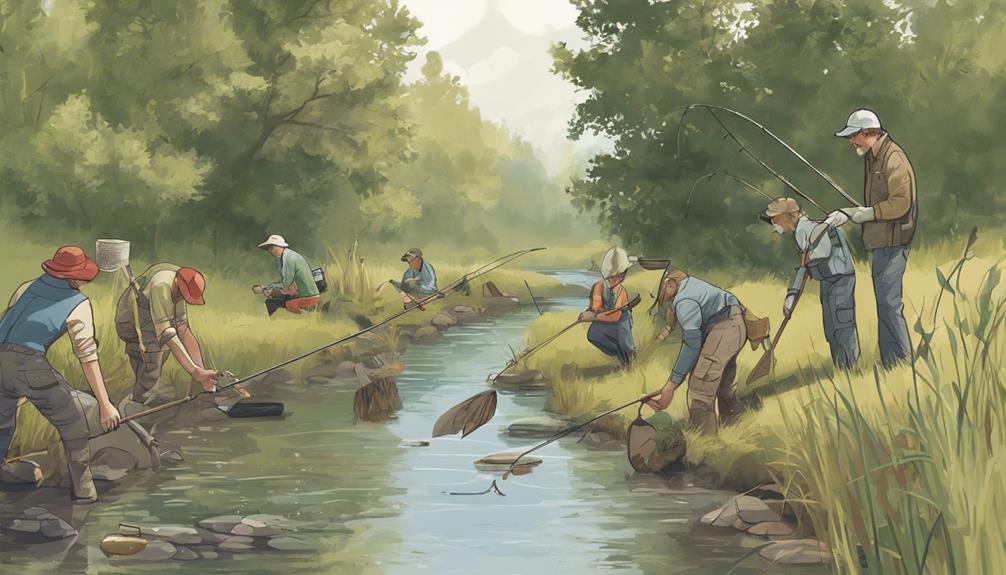
Supporting habitat restoration is crucial for anglers dedicated to preserving and enhancing the natural environments where fish thrive. By engaging in community partnerships and volunteer initiatives, anglers actively contribute to the restoration of degraded habitats, ensuring ecosystem resilience and biodiversity enhancement.
Community partnerships play a vital role in habitat restoration efforts. Anglers collaborate with local organizations, government agencies, and conservation groups to implement restoration projects aimed at improving fish habitats. Through these partnerships, anglers pool resources, share expertise, and work together towards common conservation goals. This collective effort results in more impactful and sustainable habitat restoration initiatives.
Volunteer initiatives are another essential aspect of supporting habitat restoration. Anglers volunteer their time and skills to participate in habitat restoration activities such as tree planting, stream clean-ups, and invasive species removal. These hands-on efforts are instrumental in restoring habitats to their natural state, creating healthier ecosystems for fish populations to thrive. By actively engaging in volunteer initiatives, anglers demonstrate their commitment to environmental stewardship and conservation.
Engaging in Policy Advocacy
Anglers can make a significant impact by advocating for policies that promote sustainable fishing practices and protect fish habitats. Engaging in policy advocacy allows anglers to influence decision-makers and drive positive change in fishing conservation efforts. By actively participating in policy reform and legislative engagement, anglers can help shape regulations that prioritize the long-term health of fish populations and their ecosystems.
Ways Anglers Can Engage in Policy Advocacy:
- Joining Conservation Organizations: By becoming a member of conservation groups, anglers can amplify their voices and support initiatives aimed at sustainable fishing practices.
- Attending Public Meetings: Attending meetings where fishing regulations are discussed provides anglers with the opportunity to express their views directly to policymakers.
- Writing to Elected Officials: Sending letters or emails to elected officials urging them to prioritize fish habitat protection can have a significant impact on policy decisions.
- Participating in Advocacy Campaigns: Getting involved in advocacy campaigns focused on specific conservation issues can help raise awareness and mobilize support for policy changes.
- Educating Peers: Sharing knowledge about the importance of policy advocacy within the angling community can inspire others to join in the effort to promote fishing conservation.
Frequently Asked Questions
How Do Anglers Balance Their Love for Fishing With Their Commitment to Conservation Efforts?
Balancing your passion for fishing with a commitment to conservation efforts involves being mindful of your impact on the environment. By promoting public awareness and adopting sustainable practices, you can enjoy fishing responsibly.
Support catch-and-release programs, use biodegradable gear, and follow fishing regulations to help preserve fish populations and their habitats. Remember, every angler can make a difference in ensuring the long-term health of our waters for future generations to enjoy.
What Role Do Anglers Play in Educating the Public About the Importance of Clean Water and Sustainable Practices?
You play a crucial role in educating the public about clean water and sustainable practices. Through advocacy campaigns and conservation education, anglers like you raise public awareness on the importance of these issues.
Your outreach initiatives help spread knowledge and promote responsible fishing practices. By actively engaging in these efforts, you contribute to building a community that values and protects our natural resources for future generations.
How Do Anglers Collaborate With Other Stakeholders, Such as Government Agencies and Non-Profit Organizations, to Support Habitat Restoration?
When collaborating with other stakeholders like government agencies and non-profit organizations, anglers play a crucial role in supporting habitat restoration projects.
These collaborative partnerships are essential for the success of restoration efforts, as they bring together diverse expertise and resources to make a positive impact on ecosystems.
What Strategies Do Anglers Use to Monitor and Assess the Health of Aquatic Ecosystems?
To monitor the health of aquatic ecosystems, anglers employ various techniques. They use water quality tests, stream surveys, and habitat assessments to track changes.
Biodiversity assessments help them understand the species present and their populations. By regularly monitoring these factors, anglers can identify any issues early on and work towards preserving the ecosystem.
These strategies ensure the sustainability of aquatic environments for both fish populations and other wildlife.
How Do Anglers Navigate the Complexities of Policy Advocacy to Ensure Their Voices Are Heard in Conservation Decision-Making Processes?
When navigating policies, anglers use various advocacy strategies to ensure their voices are heard in conservation decision-making processes. They engage in policy discussions, form partnerships with relevant organizations, and participate in public consultations.
Conclusion
In conclusion, anglers play a significant role in fishing conservation efforts. Through their dedication to environmental stewardship, funding initiatives, and advocacy for clean water and sustainable practices, anglers help restore fish populations and protect aquatic ecosystems.
By actively engaging in habitat restoration and policy advocacy, anglers contribute to the preservation of our natural resources for future generations to enjoy.
Keep up the great work in making a positive impact on fishing conservation!
